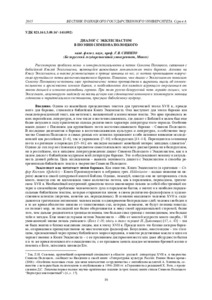Please use this identifier to cite or link to this item:
https://elib.psu.by/handle/123456789/14195Full metadata record
| DC Field | Value | Language |
|---|---|---|
| dc.contributor.author | Синило, Г. В. | - |
| dc.date.accessioned | 2015-10-14T07:33:13Z | - |
| dc.date.available | 2015-10-14T07:33:13Z | - |
| dc.date.issued | 2015 | - |
| dc.identifier.citation | Вестник Полоцкого государственного университета. Серия A, Гуманитарные науки. - 2015. - № 10. – C. 16-25. | ru_RU |
| dc.identifier.issn | 2070-1608 | - |
| dc.identifier.uri | https://elib.psu.by/handle/123456789/14195 | - |
| dc.description | Dialog With Ecclesiastes in Symeon of Polotsk’s Poetry. G. Sinilo Cand. Filol. , Professor (Belarusian State University, Minsk) | ru_RU |
| dc.description.abstract | Рассмотрена проблема мета- и интертекстуальности в поэзии Симеона Полоцкого, связанная с библейской Книгой Экклесиаста, являющейся важнейшим метатекстом эпохи барокко. Аллюзии на Книгу Экклесиаста, а также реминисценции и прямые цитаты из нее, ее топика пронизывают творчество крупнейшего поэта восточнославянского барокко. Показано, что диалог с Экклесиастом помогает Симеону Полоцкому исполнить свое предназначение поэта-проповедника и выразить мысль об относительности и временности земного бытия, о необходимости для каждого верующего отрешиться от жизни дольней и истинно возлюбить горнюю. При этом русско-белорусский поэт гораздо сильнее, чем Экклесиаст, акцентирует надежду на жизнь вечную как единственно истинную и элиминирует мотивы гедонизма и парадоксального скептицизма, присущие библейскому мудрецу. = In this paper the problem of meta- and intertextuality associated with the Book of Ecclesiastes in Symeon of Polotsk’s poetry is under consideration. The Book of Ecclesiastes is the most important metatext of the Baroque. Allusions on the Book of Ecclesiastes, as well as reminiscences, citations from it and its topoi run through the works of the first-rate poet of Eastern Slavic Baroque. The author indicated that dialog with Ecclesiastes helps Symeon of Polotsk to fulfill his mission of a poet as a prophet and to express his thought of being-in-the-world’s relativity and temporality and every believer’s necessity of renunciation of the earthly life and truly fall in love with celestial life. At the same time Russian-Belarusian poet makes a much stronger accent on the hope on life everlasting as the one veritable and eliminates hedonism and paradoxical scepticism so characteristic of the biblical man of wisdom. | ru_RU |
| dc.language.iso | ru | ru_RU |
| dc.publisher | Полоцкий государственный университет | ru_RU |
| dc.relation.ispartof | Веснік Полацкага дзяржаўнага ўніверсітэта. Серыя А, Гуманітарныя навук | be_BE |
| dc.relation.ispartof | Herald of Polotsk State University Series A, Humanity sciences | en_EN |
| dc.relation.ispartof | Вестник Полоцкого государственного университета. Серия A, Гуманитарные науки | ru_RU |
| dc.relation.ispartofseries | Серия A, Гуманитарные науки;2015. - № 10 | - |
| dc.rights | open access | ru_RU |
| dc.subject | Государственный рубрикатор НТИ - ВИНИТИ::ОБЩЕСТВЕННЫЕ НАУКИ::Литература. Литературоведение. Устное народное творчество | ru_RU |
| dc.subject | Восточнославянская литература (XVII в.) | ru_RU |
| dc.subject | Барокко | ru_RU |
| dc.subject | библейская Книга Экклесиаста | ru_RU |
| dc.subject | Симеон Полоцкий | ru_RU |
| dc.subject | поэт-проповедник | ru_RU |
| dc.subject | белорусский поэт барокко | ru_RU |
| dc.subject | тема земного бытия | ru_RU |
| dc.title | Диалог с Экклесиастом в поэзии Симеона Полоцкого | ru_RU |
| dc.type | Article | ru_RU |
| dc.identifier.udc | 821.161.3.09.16’-141(092) | - |
| Appears in Collections: | 2015, № 10 | |
Items in DSpace are protected by copyright, with all rights reserved, unless otherwise indicated.
